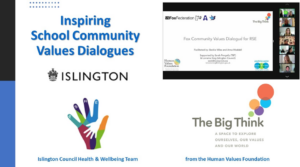The education landscape is changing
Prior to the outbreak of the Covid-19 crisis, a shift was beginning to take place in the education landscape in order to better balance what had, for many, become an intense and even harmful focus on academic outcomes with more Social and Emotional Learning (SEL). The Human Values Foundation education charity was delighted as this more rounded approach to learners’ development has always been central to our work.
Undoubtedly, children and young people are growing up in an increasingly complex world and living their lives seamlessly online and offline. For those bringing up, guiding and mentoring the emerging generation, this presents many positive and exciting opportunities but also challenges and risks. Schoolchildren need to know how to be safe and healthy, how to manage their academic, personal and social lives so they can thrive and succeed and how they can use their energy and talents to positively impact global concerns.
Against this backdrop, in 2019 the Department for Education published guidance for schools in England on a new, mandatory curriculum – Relationships and Sex Education (RSE). It was to become compulsory in all secondary schools with foundations being taught in primary schools. Health Education was to become compulsory in all state-funded schools.
Initially affected schools were expected to start teaching the combined Relationships, Sex and Health Education (RSHE) curriculum at the start of the Autumn 2020 term. However, with so much upheaval, many teachers did not feel ready or able to meet the requirements at that time and so the DfE advised that a start should be made by at least the beginning of the Summer term in 2021. Then, following the 2021 national lockdown, the DfE acknowledged the difficulties schools faced in achieving a fully comprehensive scheme of work during the 2020/21 academic year and recognised that the necessary planning was likely to continue into the 2021/22 academic year.
Our values-themed programme, The Big Think
In June 2019 we launched an innovative, multimedia, values-themed programme for the holistic development of children aged 5 to 11 that we called THE BIG THINK. During the closure of schools in 2020, we were awarded a grant that enabled us to use the time to create additional lesson packs to help primary schools advance the teaching of key social and emotional life skills and ease their preparation and delivery of the compulsory curriculum for Relationships Education and Physical Health and Mental Wellbeing.
School Community Values Dialogues enrich RSE consultations
As part of the provision for RSHE for children aged 5to 11, the schools must consult with parents about their overall Relationships and Sex Education policy and what is to be included in the programme of learning. Sex education is compulsory in secondary schools but in the primary phase, some sex education is covered in the national curriculum for science. If a primary school chooses to go beyond that, then parents must be made aware of what is to be taught.
During the Summer of 2021 when we were working online with schools that had taken up The Big Think, many teachers commented that they had received no training for almost two years and some were particularly anxious about lacking the confidence to manage some of the behaviours children were displaying as a result of what they had experienced since the pandemic crisis began. Some were also daunted by the prospect of having to consult with parents about RSE and were concerned about a gap in their training for this.
Both in the 2021 Summer and Autumn terms, we conducted training for the schools that had subscribed for The Big Think with the aim of fulfilling their school’s broader statutory requirements for their pupils’ Spiritual, Moral, Social and Cultural (SMSC) development, which encompasses the new RSHE expectations.
With the whole-school, collaborative, supportive approach we promote, the initial workshop in each school brought together a cross-section of the school community to take part in a values-led dialogue. To begin with it would have been natural for the members of the school’s senior leadership team, children from the school’s Council, a number of parents, carers and governors and other stakeholders, such as those from the local community or church as relevant, who participated in the session, to be apprehensive. However, as all the content was explored through the lens of human values, particularly The Big Think’s overarching values of Community, Peace, Love, Responsibility and Truth, everyone soon relaxed, identified shared values, had fun working together and finished their school community dialogues in good heart.
Values Dialogues as part of school improvement strategies
More recently we have embarked on a pilot with 10 primary schools in the borough of Islington in London, partnering with Lorraine King, their Health Improvement Advisor for PSHE and Children’s Life Skills. Working with the Headteachers and PSHE Leads, we are devising a training package to support teachers in the effective implementation of their Personal, Social, Health and Economic (PSHE) education schemes of work, which include the statutory duty to consult with caregivers about their RSE provision.
The sessions are already building teachers’ confidence in facilitating RSHE face-to-face and in virtual Community Values Dialogues. Up to 30 school community members attend a gathering, including staff, caregivers, school council members and community leaders. They share feedback from surveys completed by pupils, staff and caregivers to help gauge the quality and effectiveness of their school’s RSHE content, teaching and learning.
We regularly work with individual schools or clusters of schools that have chosen The Big Think for the comprehensive, rounded development of their pupils. We are currently supporting the Fox Federation of three primary schools in Kensington, London. Everyone involved is inspired as we help to embed The Big Think programme and support the RSE consultation process with the conscious application of values.

